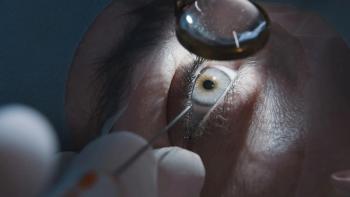
Corneal collagen crosslinking may manage superficial microbial keratitis
A study published in The British Journal of Ophthalmology found that corneal collagen crosslinking appears to be an effective procedure in the management of superficial microbial keratitis.
A
The study looked at 15 eyes of 15 patients with microbial keratitis-nine with bacterial keratitis and six with fungal keratitis. The depth of the infiltrate was determined clinically with slit lamp and measured manually using anterior segment OCT. The patients were treated with antibiotics/antifungals, and those who did not respond to at least two weeks of topical medications underwent corneal collagen crosslinking, followed by the same preoperative topical medications. Follow-up appointments were scheduled every third day to observe signs of resolution of the microbial keratitis.
According to the study, six of the nine patients with bacterial keratitis and three of the six patients with fungal keratitis resolved after the corneal collagen crosslinking procedure. However, patients with deep stromal keratitis or endothelial plaque failed to resolve. All of the patients had resolution of pain on the first day post-op.
Newsletter
Want more insights like this? Subscribe to Optometry Times and get clinical pearls and practice tips delivered straight to your inbox.





